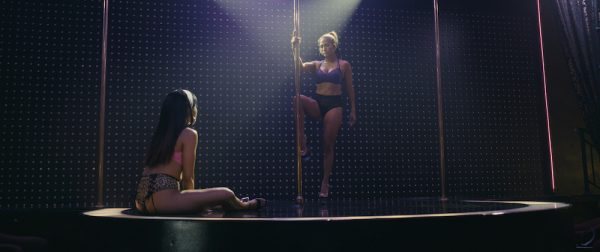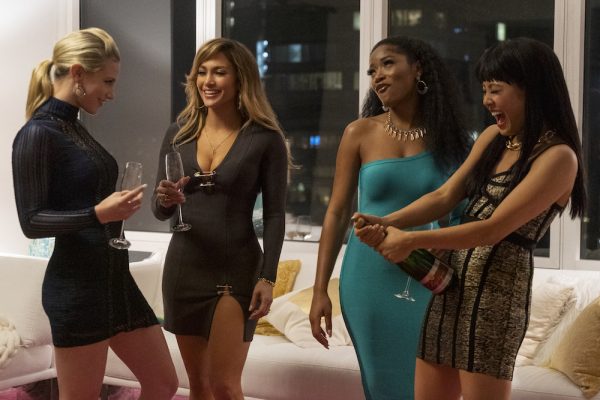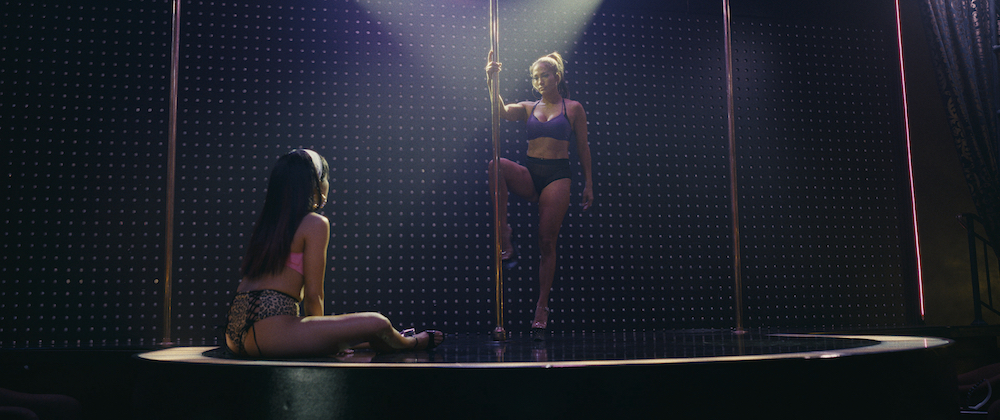
It’s been 24 years since Elizabeth Berkley licked the pole in Showgirls and I’m still mad about it, so I understand the mixture of anticipation and dread with which strippers await Hustlers. What stupid misconceptions will it leave the audience with? How many years will it be the general public’s touchstone for what we do? Will it portray all strippers as one national financial collapse away from forming a ring to drug customers, then max out their credit cards, as they did in the real-life criminal cases at the center of the New York story on which the movie is based?
Hustlers addresses that last question head-on. The film’s framing device is an interview of Destiny (Constance Wu), the character based on Roslyn Keo, by Elizabeth (Julia Stiles), a stand-in for journalist Jessica Pressler. Destiny asks Elizabeth what’s going into the story, and says she doesn’t want it to be a hit piece about how all strippers are thieves, because it’s not like that.
If you, like Destiny, don’t want to see another story paint strippers as ripoff artists, are left unable to enjoy the movie because of the real stigma faced by strippers, because FOSTA has made your life harder while movie stars build award-contending performances on our stories, or because it doesn’t resemble your experience remotely, I absolutely get it. But one reason sex workers feel our depiction in Hustlers is a high-stakes issue is the low rate of representation of strippers and sex workers as leads in major motion pictures. We’re accustomed to being props, punchlines, victims or villians, and we know that it’s going to be a long time before another stripper story is allowed to take center stage. Shouldn’t this one do something good for us? Is it good for the strippers?
Well, strippers are workers, and I think we can put Hustlers on the side of the workers in the class wars. When Destiny and her club mentor Ramona (Jennifer Lopez) work their way through the wallets of their targets, they’re portrayed as women trying to do the best they can in a system stacked against them. Hustlers takes a pretty strong position that even when an ex-stripper does drugs and robs an investment banker or Goldman Sachs exec, he pretty much had it coming. Yeah, sure, someone could have gotten killed, but they didn’t, and in post-Lehmann Brothers Manhattan, it was pretty obvious who was gonna come out fine.
There’s only two guys who are remotely sympathetic here, one of whom was the rare target who actually had so much to lose that he called the cops. Men are going to be very angry about this movie, especially those who sympathize more with entitled Wall Street shits than with working women. A brief look at the comments on IMDB show that the whole brigade that hates having female superheroes or comedians on the screen is just livid that this fictionalized story is sympathetic to its female antiheroes. But a whole lot more people—especially anyone who’s endured insults while working in the service industry—are going to sympathize as Destiny and Ramona pad their wallets in the post-recession Manhattan that finance created and then survived just fine after, as Ramona puts it, wiping out firemen’s pension funds.
Sex workers have taken issue with the movie’s #tweetyourhustle marketing campaign, pointing out that they are targeted by the law and that their hustles are criminalized. A stripper can’t use PayPal, Square, or most other payment processors without concern that her account will be suddenly closed for violating its TOS. Strippers have voiced specific concerns about Hustlers, including how the success of the movie might affect their earnings, whether the real women portrayed were dealt with fairly, and which strippers were heard by the filmmakers, who hired a white woman, Jacq the Stripper, to help them get club details right.
The first is kind of up to whether your club has shitty ownership or management that wants to collect the maximum amount of house fees and doesn’t concern itself with educating customers in the ways of compensating dancers. Our clubs have the ability to handle both of those things, but probably 90% of them won’t do anything to make our lives better!
As to the second, of the two main characters, Roslyn Keo seems fine with the movie. She recently gave another interview to NYMag. Samantha Barbash, on whom Ramona is based, has said she should be compensated for her life story rights and objects to being portrayed as a stripper. “I was never a stripper. It’s defamation of character,” Barbash told the New York Post. The question of who should get paid when true stories become works of journalism and then movies is one worth addressing, but a woman who says that being called a stripper is defamation is not at the top of my list of wronged parties in this whole deal.
Jacq, who appears in a cameo, has apologized for appearing in a Hustlers promotional video with influencer Nikita Dragun. Dragun has been accused of tipping strippers in a club with fake money printed with her likeness. Whatever else Dragun might have done, this did not actually happen. There is a video of Dragun shooting fake money from a cash cannon at her own birthday party that people took to be a scene from a strip club. It takes about four clicks to figure out that it was not from any of the outraged posts. I can’t believe I had to spend time looking this up, but that’s the state of the stripper internet in 2019.
The film’s core is the relationship between Destiny and Ramona, the superstripper whose mentorship Destiny seeks out. The early club scenes nail a lot of little details and there’s no pole-licking here or anything else as egregiously wrong. Ramona tells Destiny to point her toes, there’s a bottle of alcohol on the stage for cleaning the pole, and the male staff have their hands out for tips. Then there’s Ramona’s showstopping stage set, ostensibly circa 2007 in a Manhattan strip club, and from everything I know, it’s totally inaccurate for a very good reason: an accurate representation of an upscale Manhattan club’s stage show in the mid aughts would be boring fucking moviemaking. In Hustlers, guys in suits are making it rain while Ramona does pole tricks in a rhinestoned playsuit. In reality, “upscale” clubs made dancers wear floor-length “classy” gowns and wouldn’t allow them to do floor moves or pole tricks. Some of these places even banned Pleasers and made dancers keep wearing those painful 5″ stilettos, can you imagine? Wall Street guys were most decidedly not making it rain while Fat Joe played. Busting out the black Amex while an endless soundtrack of techno thumped, sure, but not throwing bands. But that’s a case were realism would have made for one snooze of a scene! Better that they take their inspiration from clubs like the Queens one where the movie was filmed.
Most of the things that make a strip club fun and not boring these days, like great stage performances and good music, stem from Black dancers and artists. They have been at the vanguard of club culture and fashion while facing blatant racism when working in clubs with white ownership and management, and colorism in all clubs. All the fun parts of strip club culture—all the stuff in Lopez’s big opening number where she’s being showered with money—are the things that stuffy chain clubs try to block with dress codes and bans on rap music. If anything, the movie goes gently on upscale clubs, painting them as body-posi places where Lizzo works alongside Lili Reinhart and where the most racist thing a customer does is call Destiny “Lucy Liu.”
Lizzo and Cardi B’s respective appearances feel like the late-arriving announcements they were. There’s not enough of Cardi, who’s hilarious in her brief bits helping instruct Destiny in the ways of lapdancing. Also, why is Lizzo’s character playing the flute in the dressing room? This movie isn’t set in Portland!
Hustlers is a dream showcase for female actors, packed with great performances. Mercedes Ruehl is so convincing as a house mom with a three-packs-of-Capris-a-day voice that I thought she’d been hired from the club. Wu’s progression from naif to polished media manipulator rivals Berkley’s Showgirls arc. And Lopez, god, think of what we could have had if movies were better and had given her the roles she deserved. It’s such a pleasure to see her get a character like Ramona, whose love is entirely directed towards women and girls. Also, what a bod.

For a time things are great! Destiny and Ramona work with Mercedes (Keke Palmer) and Annabelle (Reinhart) as a well-oiled machine. They achieve their goals and give each other wildly extravagant gifts. But Ramona starts getting sloppy, bringing in unreliable women. “We’re breaking the law here, we don’t want to work with criminals!” Destiny admonishes her. This decision ultimately bites them in the ass and breaks up their friendship when the cops catch up to them.
A scene that features Frankie Valli’s “Rag Doll” made me immediately think of the summer’s greatest romantic comedy, Midsommar, which plays Valli’s “The Sun Ain’t Gonna Shine (Anymore)” over the credits. It’s a nice coincidence that he features in two movies about strong women! And speaking of strong women, as a journalist I appreciated that this was one of the rare movies in which a female journalist did not fuck her profile subject.
Sex working women have the same issues of representation that women in general have, which is that in areas where we are underrepresented, we bear the weight of whether what we do is feminist enough or whether a woman’s mere achievement makes something feminist. Men get to just be people with their own motivations. Hustlers gazes on women with the kind of adoring eye that male antiheroes have enjoyed. None of these women beg for respectability, and the film ends on a resolutely unapologetic note. It feels good to not need redemption.

Great review! I appreciate your candor and perspective, and your writing is spot on!
I’ll look forward to viewing this movie with your efforts in mind.
The flute/ Portland comment made me actually laugh aloud. Great review! Excited to see it!
Hmm. Sounds like it is worth watching. Saw it listed at the theater here and my first reaction was, to sigh, and wonder how badly screwed up it would be, given fairly recent examples of “girls night” type movies, and the BS tropes they have pulled in them.
Though, if someone really wanted to do a “good” movie on the subject.. It should probably be something like a montage type. Following the lives of, say, three women, or even a few guys too, as they go, day to day, through the crap they have to put up with in their jobs, with some of them unable to handle it, and turning to questionable choices, and others finding themselves in trouble do to the changes in laws, and others squeaking by somehow, but **all** of them basically going through the same problems. But, with some of the ones that “find a way out” being not the ones people expect (like, say, someone stripping, or even doing sex work, to pay their way into college), while the ones that burn out being those that do “everything right”, but the entire way the world is structured shoves them into a corner they can’t get out of, and no one notices them drowning, because, well… “they are doing everything they where they should.”
Would probably require something like an HBO miniseries, and.. finding someone that wouldn’t F it up….